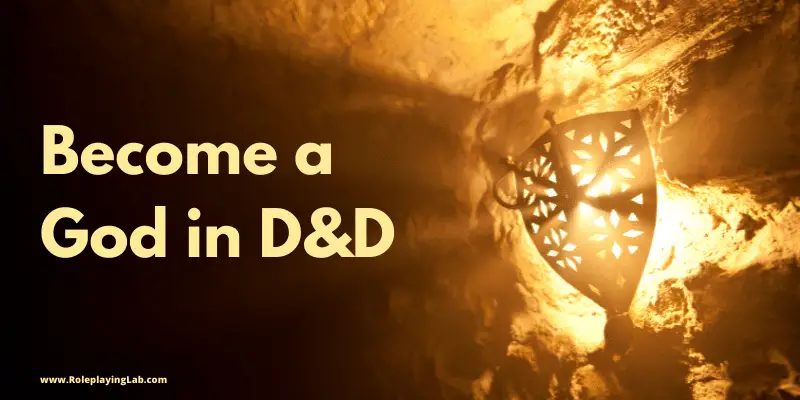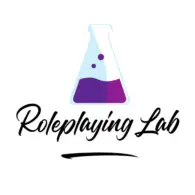At some point, players are bound to seek out godhood.
Can you become a god in D&D?
Players can become gods in D&D. To become a god, players must create a portfolio, gain power, gather followers, perform rituals, collect artifacts, cast god-making spells, and ascend to deity status. You can also kill and replace an existing deity. This process is difficult and takes years.
In this article, I’ll answer the most common questions people ask about becoming a god in D&D.
Can Anyone Become a God in D&D?

It is not easy, but nearly anyone can become a god in D&D.
Players usually first become a demigod, a form of lesser godhood. Demigod status allows you to claim an immortal legacy, but it is still far from claiming the full power of a greater god.
Demigod characters grow in power as they age.
When they reach their full potential, demigods can potentially ascend to greater godhood—sometimes by collecting the necessary experience points and sometimes by replacing a slain god.
However, there are several ways that you can become a god in D&D (see below).
I’ll give you tips on how to make this happen sooner rather than later.
How to Become a God in D&D (Multiple Paths)
There are multiple proven paths to godhood. A Dungeon Master (DM) can also create their own path.
Players can become a god in D&D in the following ways:
- Create a portfolio
- Obtain a divine spark
- Gather followers
- Perform godhood rituals
- Cast a godhood spell
- Find and use a godhood item
Create a Portfolio
The first step in becoming a god is identifying your deity portfolio.
A portfolio is a deity’s area of concern, interest, or responsibility. Every deity has a portfolio. For example, the portfolio of a god can be Life, War, Strength, and so on.
Each portfolio often comes with an opposing pair (such as Life/Death) that allows for balance and contrast.
Detailing your portfolio informs the rest of your path toward becoming a god in D&D
Obtain a Divine Spark
Another important step toward godhood is getting a divine spark.
A divine spark is a glimpse of divinity, which can bestow a small measure of a deity’s power.
A higher god, such as Ao, the creator god of Forgotten Realms, can give anyone a divine spark.
Some artifacts also contain a bit of divinity that you can absorb.
The more dangerous albeit intriguing option is stealing a spark from another god by killing him or her on their home plane. Another possibility is to locate the dead body of a former god and harvest their spark.
Locations can also absorb the divine spark of fallen gods.
In this case, a DM could write a campaign or one-shot adventure where players learn to harness the divine spark from temple ruins.
Gather Followers
To become a god in D&D, you’ll need fame and followers.
In fact, some mortals have ascended to godhood in D&D lore simply for existing for long, becoming known, and developing masterful abilities that transcend mortal skills.
In this method, you start a cult and gather as many followers as possible. You need at least 100,000 followers to become divine.
The more you recruit, and the faster you recruit a following, the better.
Here are some ways to gain followers:
- Create a religion.
- Construct a temple or temples for people to worship
- Perform feats (adventures, miracles, defeat evil gods, etc.) that get attention—bonus if you can get the attention of a god or demigod.
- Start a cause of helping people.
- Cast spells that allow you to influence people on a large scale.
Creating a small, budding religion is considered creating a cult in D&D. Cults are groups of people who follow the same person, idea, or god.
They worship you, pray to you, and ultimately do your bidding.
If you want a D&D “hack” to become a god through followers, get yourself a large population of kuo-toa to worship you.
According to D&D legend, kuo-toa (fish people) possess the rare physic ability to mentally generate gods by the sheer power of their collective belief.
That spell of mass influence might come in very handy here.
Perform a Ritual To Become a God
Rituals can make a mortal into a god in D&D.
An example is the Ritual of Seeding that turned Vecna into a god.
To perform this or other godhood rituals requires a high level, extreme skill, and often many spellcasters working together.
Here’s an example of a godhood ritual I created for a homebrew campaign.
The Ritual of Ascension requires fifty 20+ level spellcasters to simultaneously cast spells in a specific set of ruins under the Moonglow of a specific night.
The spells performed:
- Create Demiplane (to create a permanent demiplane with divine power)
- Etherealness (to allow the god to exist outside of their or one’s own demiplane)
- Wish spell for the location of a divine spark
The divine spark is then located and placed in the mortal’s heart, connecting them to their demiplane and making them a god.
As you can see, rituals often involve spells and legendary items.
Locate and Use a Legendary Item
The Infinity Spindle can make any being into a god.
However, it is tough to find because its protector, Raxivolt, keeps himself and the spindle well hidden.
Your Dungeon Master (DM) can also homebrew new legendary or magical items.
Most of these items share common characteristics.
Namely, they are impossibly rare, have extra-dimensional capabilities, are capable of storing godly power, can be used to channel energy into spells, and are protected by guardian entities.
For example, I came up with the Seed Spear, a weapon forged by the god Pelor.
When used to pierce a demigod or avatar (the form of a god on the material plane), it creates tiny rifts that allow divine sparks to leak out onto a person, place, or object.
The players can then absorb the divine spark to gain godhood.
Cast a Godhood Spell
There are two common spells connected to players ascending to divinity in D&D.
Those two spells are:
- Wish
- Karsus’s avatar
Since I answer the question, “Can a wish spell turn you into a god?” in the next section, let’s talk about Karsus’s avatar.
This is a spell from the Forgotten Realms that is said to allow anyone who casts it the opportunity to ascend into godhood.
The spell essentially steals the divine power from another god.
Sounds pretty cool, huh?
The downside is that the spell is temporary. Your players could still use it, temporarily become a god, then grant a more permanent divine spark or kill another lesser god.
Here is a good and short 1-minute video on how to become a god in D&D:
Can A Wish Spell Turn You Into a God?
A wish spell probably will not automatically make you a god (that would be too easy).
But it can grant you easier access to godhood.
You could wish for a million worshipers for your cult, for example, or the knowledge, power, and ingredients to perform the Karsus’s Avatar spell.
You could also wish for the Infinity Spindle, Seed Spear, or another item.
Players could wish for access to the gods to request their blessing.
Another option is to wish for an accelerated path to level 20+. Most mortals who become gods are high-level characters.
As you can see, the wish spell is limited only by the parameters placed by your DM (and the broad, official rules of D&D).
Can You Make a God in D&D?
Dungeon Masters do not have to use the canon gods in their D&D campaign.
They can create new ones.
Here is how to make a god in D&D:
- Your god will need a portfolio: Remember, a divine portfolio details what the god represents, its powers, and its weaknesses.
- Give your god a name: Creative license lies with you on this one.
- Define how this god relates to mortals: Is he/she good or evil? What does he/she do for people, and what does he/she need from them? What elements do they affect, and how?
- Assign symbols to the god to represent them: Symbols can be any object, shape, color, sound, or even creature.
- Give your god a divine realm: This will be the god’s demiplane.
- Design temples that hold your god’s power: This will be the church of your god.
- Determine the rules for worshipping the god: Is it prayer, sacrifice, dance, rituals?
There, now you have a brand new D&D god.
Players can even make a god inside of the game by following the paths to godhood outlined earlier in this article.
Instead of becoming gods themselves, players follow the paths to bestow godhood on others.
Final Thoughts: Can You Become a God in D&D?
One of the things I love about D&D is the flexibility and freedom to create entire universes, worlds, and pantheons.
Play around, experiment, and have fun. After all, that’s the ultimate reason we play D&D.
Related posts:
- Can You Kill a God in D&D? (Complete Guide for Beginners)
- Can You Dash Twice in D&D? (Solved)
- Can You Cure Vampirism in D&D (Answered)
- Is D&D Nerdy? (Answered and Solved for Beginners)

